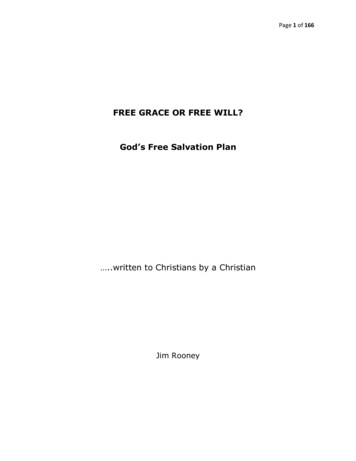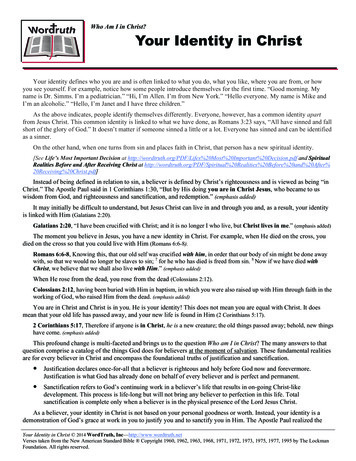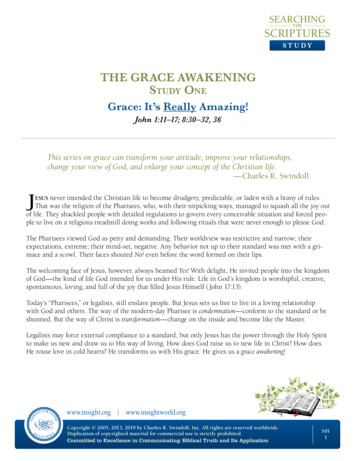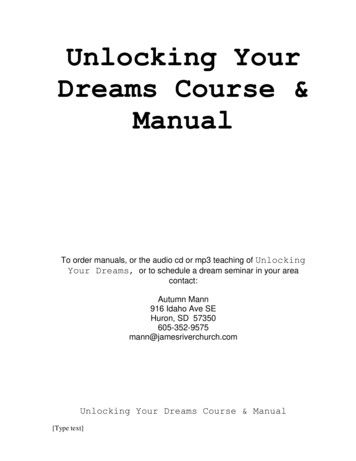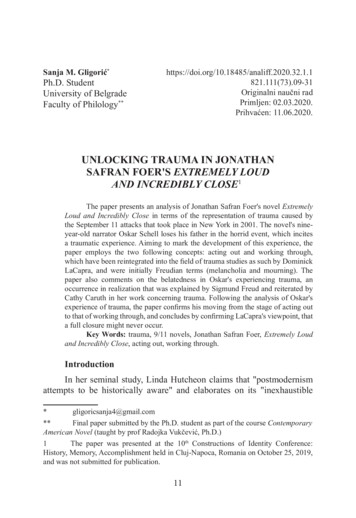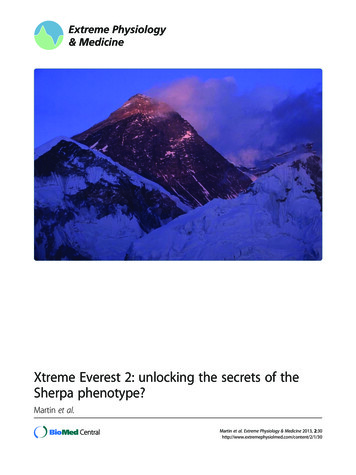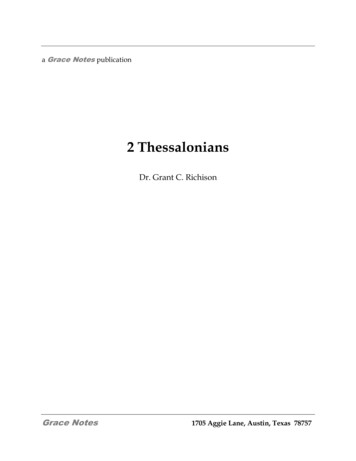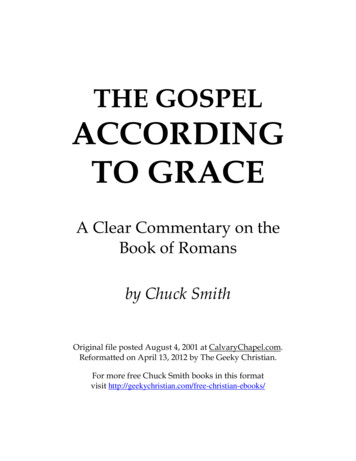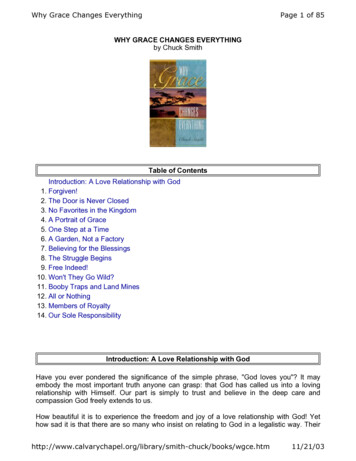
Transcription
Unlocking GraceA study guide in the doctrines of gracebyRoger Smalling, D.Minwww.smallings.comThis book is now available for KINDLE 2001 Deo Volente Publishing, New Mexico. Revised March, 2019.All verses are quotes from the English Standard Version unless otherwise indicated.
TABLE OF CONTENTSThe AcronymChapter One: Sovereignty of GodChapter Two: Inability of ManChapter Three: Justification by FaithChapter Four: Election by GraceChapter Five: Sacrifice of ChristChapter Six: Unity and Universality of the ChurchChapter Seven: Security of the ElectChapter Eight: The Golden ChainEpilogue
Preface2Has it ever struck you as peculiar how God occasionally does things in roundabout ways?Take the definition of grace for example. Since we are saved by grace, it would seem proper forGod to define it at the beginning of the Bible. He could have inspired a prophet to write adictionary definition starting with something like, grace is defined as etc. This would be tothe point, just as we moderns like it.That is not what we find, is it?Instead, we encounter a series of stories about imperfect people whom God liked for littleapparent reason. This helps moderately, but at this juncture the matter remains ambiguous.Next, we encounter a series of negations. Grace is not works. Grace is not deserved. Grace isdivine and not human and so forth. We find our definition-search improving, but nailing it downseems like grabbing smoke.Then we notice how Bible writers connect grace with certain teachings they claim are important.These doctrines quickly begin to unlock the definition and our understanding improves.When we encounter the cross, though, all the previous material takes on substance. The fog liftsand the reason for the delay becomes evident.God could have given us a short definition but it would be pitifully shallow. The longer routeturns out to be deeper and infinitely more satisfying. A brief definition would save us time buttime seems a low-priority item with him. Other matters, such as a job done thoroughly, appearmore important to the Father, especially when it has to do with blessing his people.Grace itself would never short-change us with paltry definitions. So God goes about defininggrace in the only way that could do it justice. Grace is altogether too glorious to do it any otherway. Why? Grace reflects an essential element of God’s character. Each member of the Trinitycontributes in his own awesome style. Looking at it like that, it seems amazing the Lordmanaged to define it at all, since grace is involved with defining himself.Yet once we grasp it, we say, Oh! How remarkably simple! Then we do a double-take and say,But how incredibly profound!After all, that’s typical of God’s style, isn’t it? Did we expect anything else?That’s one reason I believe the doctrines of grace are biblical. They’re his style. His fingerprintsare all over them.
So the study of grace turns out to be an involved journey, with unexpected twists. The trip is longbut not boring, and truly exhilarating. One of these twists is that while we are defining grace, wefind ourselves defined more clearly like it or not. There is plenty of glorious scenery on theway, though, and different people delight in contemplating various views of the route.Some revel in the authority of a sovereign will. Others savor the security of an eternal covenant.Still others are enthralled at the power of the cross. Personally, the part of the trip I enjoy themost, is that it lasts forever.Enjoy the journey.
IntroductionThe Protestant Reformation caused a rediscovery of the Bible, and with it, the revolutionarydoctrines it contains. Several of these doctrines conflicted with the teachings of the time becauseeach affirmed that salvation is by grace alone, with no contribution by man. Consequently, thesedoctrines are known today among Christians as the doctrines of grace.The controversy continues. These biblical teachings are so destructive to man’s pride that humanemotion rebels against them. Sinful human nature imagines itself to be captain of its fate, fullyable to contribute to its own salvation.A missionary did this study of the doctrines of grace originally in Spanish to Latin America. Foreasier memorization, these key biblical doctrines were in the form of an acronym. That is, eachletter of the words, SI, JESUS (Yes, Jesus) represents one of the doctrines of grace. For thepurposes of this English version, the author has chosen to maintain this form to preserve theacronym and simplify the study of these truths.
The AcronymSovereignty of GodS The word sovereign means control everything. This doctrine teaches that God controlseverything that happens, and that all reality is a consequence of divine decrees established frometernity, before the creation of the world.Inability of manI When Adam fell, mankind lost all ability to contribute to salvation. Sin infects every aspect ofthe individual and enslaves him. This doctrine also deals with the question of free will, showingthat a sinner is incapable of choosing Christ, or producing saving faith, apart from a miracle ofgrace. Total Inability or Total Depravity are other terms frequently used to describe this teaching.Justification by faith aloneJ God requires nothing less than absolute righteousness, as described in his moral law. How thenis it possible to be righteous before God, knowing that we cannot keep the law perfectly? Christfulfilled the law’s demands as our substitute, both in his life and in his death. When we acceptChrist, God not only forgives our sins, but also attributes to us the perfect righteousness ofChrist. Thus, we have an imputed perfection relative to God’s holy demands, and this forms thebasis of our permanent acceptance before God.Election by graceE Before the foundation of the world, God chose certain individuals as recipients of hismarvelous grace. He did this apart from any foreseen conditions in us. God’s choice was notbecause he saw ahead of time that the person would choose Christ. No one could do that anywaysince all were dead in sin. Though election has no basis in human merits, it is not arbitrary. Thisdoctrine presents grace as a product of God’s sovereign decree in eternity, and not as a responseto something man thinks or does.Sacrifice of ChristS The sacrifice of Jesus is the only cause of the salvation of the elect. The crucifixion madesalvation much more than a mere possibility. It accomplished salvation for all the elect. AlthoughChrist’s sacrifice is sufficient to save everyone, God the Father designed it for his elect only. Thecross is the power-source that guarantees that God’s chosen ones will believe and be obedient.This doctrine is also called limited atonement, and sometimes particular redemption.
Unity and universality of the churchU The Church of Christ is essentially an invisible organism, rather than a visible organization. Itis composed of all the elect of God throughout the ages. Christians have a spiritual unity amongthemselves, whether or not they are unified organizationally. This unity is therefore spiritual andinvisible, not terrestrial and visible. It is universal in the sense that the spirituality of the body ofChrist and the communion the elect have with one other, transcends all limits of culture and time.Security of the believerS The same grace that saved us, preserves us to the end. Through exhortations, warnings andfatherly rebukes, God preserves his elect so that none will be lost.
Questions for Review1. The doctrines of grace lead us to the conclusion that salvation is solely by, without any human contribution.2. The Reformation doctrines are known today as.3. True or False : The doctrines of grace are no longer controversial today.4. Sinful human nature wants to be of its own .5. True or False : Man is capable of contributing to his own salvation.Sovereignty of God6. What does sovereign mean?7. True or false : Reality is a consequence of the divine decrees.8. When did God decide all things?Inability of man / Total depravity9. Which parts of the human individual were affected by sin?10. This doctrine teaches that a sinner’s will is incapable of coming to Christ for.11. True or False : Saving faith comes from our own free will.12. Where does saving faith come from?13. Our inability to contribute to our salvation came about through the fall of .Justification by faith alone14. True or False : The righteousness of the law has nothing to do with theChristian.15. God only accepts the of Christ.16. Can we fulfill the law for ourselves?
17. Who fulfilled the law for us?18. When we accept Christ, God grants to us the perfect of Christ.Election by grace19.Justification means .20. True or False God chose everyone to be a recipient of his grace.21. True or False No one can choose Christ under his own power.22. Before we knew Christ, we were in sin.Sacrifice of Christ (Limited Atonement)23. What makes salvation effective for the elect? .24. The death of Christ not only made salvation a , it it.25. True or False The cross was insufficient to save everyone.Answers: 1. Grace 2. The doctrines of grace 3. F 4. Master, fate 5. F 6. Controlling everything 7.T 8. Before the creation of the world 9. All of them 10. Salvation 11. F 12. God 13. Adam 14. F15. Righteousness of Christ 16. no 17. Christ 18. Attributed, righteousness 19. Declared just 20.F 21. T 22. Dead 23. The cross 24. Possibility , accomplished 25. F
Chapter One: Sovereignty of GodThe sovereignty of God is the only legitimate basis for a solid faith.Although someone might claim to have faith without believing in God’ssovereignty, a close examination exposes a trust based on human ability.Divine sovereignty is so crucial to biblical Christianity that without it, ourfaith is scarcely worthy of the name Christian. But the pervasive influenceof humanism in modern society has deeply affected every domain ofthinking, from the political to the religious. Even among conservative Christians, the sovereigntyof God is frequently neglected in the pulpit. This is unfortunate, because it is the only possiblefoundation for a stable Christian walk. Everything else crumbles under the pressures of life.This doctrine contends that all reality is a product of divine decrees established before thecreation of the world. It claims that God is in control of everything that happens, good or bad.This does not mean, however, that God causes evil or is the author of sin. Nor does he rejoice inthe sufferings of his creation. It indicates that everything forms part of a great plan that willinevitably result in his glory.Why do we say it is the only valid foundation for the believer’s faith?First, only a sovereign God can guarantee his promises. Only if he controls everything can wetrust him for salvation. Otherwise, something he does not govern might prevent him from savingus. Is it logical to trust in a God who does not control everything?Second, if God were not sovereign, it would be impossible to derive spiritual lessons from theevents of our lives. We could never know if God is teaching us something, or if the episodes oflife are mere happenstance. Trusting God would be little better than trusting to luck.Third, the sovereignty of God is the only basis on which to give him glory. Unless he isresponsible for the entire work of salvation in our lives, why give him all the glory?Fourth, this is the only basis for prayer. Why pray to a God who is not sovereign? Unless hecontrols everything, then perhaps he cannot answer us, either.The very idea of sovereignty implies unlimited control and authority. It is impossible for God tobe little bit sovereign or even mostly sovereign. Thus, it is illogical to contend, God is sovereign,but . If we add the word but, we confess we do not really believe God to be sovereign. Suchaffirmations are like proposing that God is somewhat infinite, or almost all-powerful. Any effortto qualify God’s sovereignty is a tacit denial of it.How we know God is sovereign
Four foundational biblical ideas establish the sovereignty of God. These follow in logical order: The divine attributes of omniscience and omnipotence.The immutable will of God. (This means unchangeable.)Reality as a product of God’s will.God owns everything.First Foundation: His attributesThe Bible teaches God’s omniscience, meaning that he knows everything. Known to God frometernity are all his works. Acts 15:18Omnipotent means that God is almighty. For the Lord our God the Almighty reigns. Revelation19:6Denial of the sovereignty of God implies a denial of one or both attributes. Example: Supposesomething happens that God did not ordain. It could only be for one of two reasons: Either hedid not know it was going to happen, or he lacked the power to prevent it.In the first case, he would not be all knowing. In the second, he would not be all-powerful. Theexistence of these two attributes makes it impossible for anything to happen without divinepermission.Second Foundation: ImmutabilityThe word immutable means never changing. It also carries the idea of irresistible. This term isfound in Hebrews 6:17-19. To better understand it, it helps to distinguish between two aspects ofthe divine will. These are his will of command versus his will of purpose.God expressed his will of commands as moral edicts, such as the TenCommandments. God allows people to transgress these laws, and man sinsin doing so. But when God decrees that he will fulfill a certain purpose, heallows no one to invalidate or hinder that it.Example: Suppose God said, “Do you see that tree? I command that noone should cut it down.” This would be a divine injunction, the expressionof his will of commands. Would God permit someone to cut the treedown? Yes, because God allows his commands to be broken.Suppose, though, God said, “My sovereign purpose is that this tree never be cut down.” WouldGod allow someone to cut it down? No power on earth, human or demonic, could cut down thattree. God would prevent it.
Were it not for his will of commands, man would not be allowed to sin. And without his will ofpurpose, we would lack the confidence that God could fulfill his promises.Theological disaster results from ignoring the difference between these two aspects of God’swill.So, his will of command can be resisted. God himself may choose to change to his commands.Not only does he allow his commands to be broken, he may even annul them. The Old Testamentceremonial laws, for example, are no longer binding.Not so with immutable decrees. These never change, and no one stops him from accomplishingthem. This idea is sometimes expressed in Scripture as his counsels.My counsel shall stand, and I will accomplish all my purpose, Isaiah 46:10Other times, the word purpose expresses the same thought.So when God desired to show more convincingly to the heirs of the promise theunchangeable character of his purpose, he guaranteed it with an oath,Hebrews 6:17 according to the purpose of him who works all things according to the counsel of hiswill. Ephesians 1:11For the Lord of Hosts has purposed, and who will annul it? His hand is stretched out,and who will turn it back? Isaiah 14:27Some texts may not use these terms, but the idea comes across unmistakably. and he does according to his will among the host of heaven and among the inhabitantsof the earth; and none can stay his hand or say to him, “What have you done?” Daniel4:35Through the concept of immutability, we see more clearly what is meant by the phrasesovereignty of God. We have more than solid grounds for trusting him.Third Foundation: Reality is a product of God’s willFor he spoke, and it came to be; he commanded, and it stood firm. Psalm 33:9This answers the question, “Where does reality come from?”According to the Bible, all reality is a product of the divine decrees, established before thefoundation of the world.
By faith we understand that the universe was created by the word ofGod, so that what is seen was not made out of things that are visible.Hebrews 11:3This verse can be translated as, By faith we understand that the epochsof time were established.The events of history, good or bad, have taken place by the will of God.This includes the most important as well as the most insignificant events.Worthy are you, our Lord and God, to receive glory and honor and power, for you createdall things, and by your will they existed and were created. Revelation 4:11This affirmation is clear. All things owe their existence to God.Occasionally we read in the Gospels, .this happened that the word might be fulfilled. Thisphrase says more than that prophet simply predicted the event. It says that the event took place tofulfill the decrees of Scripture. Normally, people involved in fulfilling these prophecies wereunaware they were fulfilling anything.In this we see the bottom-line principle behind the sovereignty of God: Reality is a product ofthe will of God. A prophecy is simply a declaration of that will. Reality obeys what God hascommanded.Prophecy therefore is more than divine foresight. It is a declaration of infallible divine intent.Here are several examples:In Matthew 21:1-4, Jesus told his disciples to look for a certain donkey in a village. Surely theowner was unaware of Zechariah’s prophecy concerning Christ’s triumphal entry into Jerusalem.The entire incident illustrates the sovereignty of God in the sense that the prophecy was morethan divine foresight. It was a divine arrangement.When the crowd came to capture Jesus in Gethsemane he said this occurred to fulfill theScriptures.1 In the texts that describe the arrest and crucifixion, it’s obvious that everything takesplace according to a divine plan.The Roman soldiers divided Christ’s garments to fulfillwhat was written by the prophet. These pagans wereunaware they were fulfilling Scripture.How does God know the future with certainty? Somesuppose that God has a mental capacity, like a supreme
fortune-teller, allowing him to peer in the future; as though he had a telescope through which tolook down the corridor of time and examine coming events. Some teachers even assert that Godforms his plans based on this discernment. This idea is called the concept of foreknowledge.Many Christians believe this idea today. Yes, the word foreknowledge appears in Scripture.However, to interpret it strictly in terms of a passive divine observation is a defective approach.After all, who created time? Did God create it? Or is time something God discovered by chancein the course of eternity?If God created everything, then he also created time. And if he created time, he also ordained theevents that occur in it. If we deny this, we are affirming that God created the universe withoutpurpose, or without full comprehension of what he was creating.The only sensible option left is the scriptural teaching about sovereign decrees. Theforeknowledge of God is simply his own understanding of his purposes, which no power in theuniverse can change.Fourth foundation: God owns everythingDuring a Bible study, a woman asked, “Who owns the earth, God or Satan? With all thewickedness going on, it looks like Satan!” What does Scripture teach?Exodus 9:29 .so that you may know that the earth is the Lord's.Exodus 19:5 .for all the whole earth is mine.Deuteronomy 10:14 Behold, to the LORD your God belong the heaven and the highestheavens, the earth with all that is in it.Job 41:11 Whatever is under the whole heaven is mine.1Chronicles 29:11 Yours, O LORD, is the greatness and the power and the glory and thevictory and the majesty, for all that is in the heavens and in the earth is yours. Yours isthe kingdom, O LORD, and you are exalted as head above all.Psalm 89:11 The heavens are yours; the earth also is yours; the world and all that is init, you have founded them. and yours also the earth; you founded the world and all that isin it.Some imagine that when Adam fell into sin, God lost control of the earth. Note that all the aboveverses are post-fall and present tense. With Adam’s fall, God lost nothing. The only loser wasAdam.Let’s delve into some specific categories of reality that God controls.
God is sovereignOver natureAre not two sparrows sold for a penny? And not one of them will fall to the ground apartfrom your Father. Matthew 10:29According to Jesus, the Father controls the lives of animals. Not even the most insignificant birdcan die without God’s permission. The same is true for us. We are worth much more than thebirds, and cannot die until our Father allows it.God brought quail to the Israelites. He closed the lions’ mouths in the presence of Daniel. Heplaced a coin in the mouth of a fish that Peter would catch. He used frogs, lice and flies asjudgment on Egypt. He sent grasshoppers against Israel, brought the animals to Noah’s ark, andfed Elisha by means of ravens.God also manifests his sovereignty through use of the inanimate. He controlled the flood, sentdarkness, hail and fire upon the Egyptians. Christ rebuked and calmed the storm. God caused thesun to stand still at the command of Joshua. Not even a fly can buzz without divine permission.Over human governments and the human raceAnd he made from one man every nation of mankind to live on all the face of the earth,having determined allotted periods and the boundaries of their dwelling place, Acts17:26The first thing Paul preached to the Athenian pagans was the sovereignty of God. He realizedthat this truth is central to a proper understanding of the gospel.The book of Daniel is a complete study of God’s sovereignty in human government. God taughtKing Nebuchadnezzar a difficult lesson about who establishes kings on the earth, (Daniel 4:17).After having received divine punishment for his pride, the king recognized this with the words, all the inhabitants of the earth are accounted as nothing, and he does according to hiswill among the host of heaven and among the inhabitants of the earth; and none can stayhis hand or say to him, “What have you done?” Daniel 4:35Over the human willCan God overrule the limits of the human will? Does God’s sovereignty extend even to man’swill and thoughts? Scripture provides an answer.The king’s heart is a stream of water in the hand of the LORD; he turns it wherever hewill. Proverbs 21:1for God has put it into their hearts to carry out his purpose by being of one mind and
handing over their royal power to the beast, until the words of God are fulfilled.Revelation 17:17If it is easy for God to alter the course of a river, then it would not be difficult to change the heartof a king. So if he can change even a king’s heart, how much more the hearts of ordinary people?God gave Israel favor in the sight of the Egyptian people and then hardened Pharaoh’s heart toshow his power.And the Lord had given the people favor in the sight of the Egyptians, so that they letthem have what they asked. Thus they plundered the Egyptians. Exodus 12:36And I will harden Pharaoh's heart, so that he will pursue them. Exodus 14:4Many are the plans in the mind of a man, but it is the purpose of the LORD that willstand. Proverbs 19:21True, man has a will. But it is not sovereign. Some have preached as though the will of man werea holy ground on which God himself cannot tread. The only inviolable will in the universe, isGod’s.Over evilGod never compels anyone to sin. Though he is sovereign, he cannot be accused of being theauthor of sin. Man sins because he has a sinful nature, not because God compels him.Nevertheless, no one can sin unless God permits it. The Bible reveals that even the circumstancessurrounding sinful acts are under God’s sovereign control. He has power to prevent or to allowman to sin. It is just as offensive to declare that God cannot prevent man from sinning as todeclare that God causes sin.How can God limit sin and control its circumstances without being guilty of causing it?When a rat is placed in a cage, it usually runs around the inside walls. Rarely will it just sit in themiddle of the cage, because its natural environment is normally closed-in areas such as tunnels orother enclosed spaces. Rats feel more comfortable pressing against something. If we want to seea rat running in circles, we simply place it in a round cage. Its movements are predictablewithout any violation of its nature.The same happens with man. God controls his sinful actions by simply arranging thecircumstances surrounding the act. Through his intimate knowledge of the nature and characterof those involved, God remains in control of everything, yet is not responsible for the sincommitted. He obliges no one to sin, though he may indeed arrange the circumstances that allowpeople to express what is already in their heart.
The outstanding example of this is the arrest and crucifixion of Christ.Jesus said to them, “Have you never read in the Scriptures: “‘The stone that the buildersrejected has become the cornerstone; this was the Lord’s doing, and it is marvelous inour eyes’? Matthew 21:42Paradoxically the rejection of Christ by the Jews was something that Matthew attributed to God.Not only did he know about it ahead of time but, this was the Lord’s doing, Nevertheless, theJewish leaders acted according to their own desires, without compulsion. God’s will of commandtold them not to harm his prophets. God’s will of purpose decreed that this was exactly whatneeded to take place to fulfill his higher purposes in redemption. for truly in this city there were gathered together against your holy servant Jesus,whom you anointed, both Herod and Pontius Pilate, along with the Gentiles and thepeoples of Israel, 28 to do whatever your hand and your plan had predestined to takeplace. Acts 4:27-28The sovereignty of God and man’s freedom run together through Scripture like two train rails.They complement each another. The Bible writers never considered this a contradiction. Theyaffirmed the two, as shown in the preceding text, without the slightest reservation.Motivated by selfishness and hatred, Joseph’s brothers sold him into slavery. Obedience to Godwas farthest from their minds. Notwithstanding, the Scriptures describe this treachery as a divineact.So it was not you who sent me here, but God. He has made me a father to Pharaoh, andlord of all his house and ruler over all the land of Egypt. Genesis 45:8As for you, you meant evil against me, but God meant it for good, to bring it about thatmany people should be kept alive, as they are today. Genesis 50:20As part of the divine judgment upon David for his sin with Bathsheba and murder of Uriah, Goddeclares that other men will lie with the wives of David, before all Israel. The way this decree isexpressed is very revealing:Thus says the LORD, ‘Behold, I will raise up evil against you out of your own house. AndI will take your wives before your eyes and give them to your neighbor, and he shall liewith your wives in the sight of this sun. (12) For you did it secretly, but I will do this thingbefore all Israel and before the sun.’” 2Samuel 12:11,12When David’s son Absalom temporarily ruled, he committed incest with his father’s wives.Though it seems odd to assert it, this happened as God’s judgment on David. God himself raised
up Absalom as a rebel against David and decreed this would take place. Nonetheless, Absalomalone was guilty of the sins of rebellion and incest although God decreed these acts asjudgments.How could God decree this and remain holy? The Lord simply provided Absalom theopportunity to express what was already in his perverse heart.Doctrines of this type are like raw meat for some people; hard to swallow. But they are the clearteachings of the word of God. If God is sovereign over all, then he is also sovereign over evil.Otherwise, we cannot call him sovereign.Other scriptural examples of the sovereignty of God over evil are: King Saul killed himself byfalling on his own sword, according to 1Chronicles 10:4. Yet in Chapter 5 verse 14, we note itwas God who killed him.The apostle Paul teaches that the unbelief of the Jews forms part of the divine plan to includeGentiles in the covenant of grace, (Romans 11:7-11).When David fled from Jerusalem, Shimei cursed him. This was wicked on Shimei’s part.Nonetheless, David recognized that Shimei did what the Lord had decreed.Leave him alone, and let him curse; for the Lord has told him to. 2Samuel 16:11Even evil spirits are under God’s control. God sent an evil spirit to speak through the falseprophets during Ahab’s reign.Now therefore behold, the LORD has put a lying spirit in the mouth of all these yourprophets; the LORD has declared disaster for you. 1Kings 22:23The deceptions that afflict men sometimes come from God as judgments for rejecting the truth.The sovereign Lord himself chooses the kind of deception suffered.Therefore God sends them a strong delusion, so that they may believe what is false, (12)in order that all may be condemned who did not believe the truth but had pleasure inunrighteousness. 2Thessalonians 2:11The Scriptures attribute to the Lord the stubbornness of Eli’s sons in spurning their father’sreproaches. God allowed them to express their wickedness as judgment against Eli for hisfatherly negligence and poor example as priest.But they would not listen to the voice of their father, for it was the will of the LORD to putthem to death. 1Samuel 2:25
Sickness came into the world because of sin. Who has made man's mouth? Who makes him mute,or deaf, or seeing, or blind? Is it not I, the Lord? Exodus 4:11A hurricane destroys a town. A landslide buries a village. Does disaster come to a city unless theLord has done it? Amos 3:6Although Satan is an active agent of evil, divine permission limits his activi
Take the definition of grace for example. Since we are saved by grace, it would seem proper for God to define it at the beginning of the Bible. He could have inspired a prophet to write a dictionary definition starting with something like, grace is defined as etc

